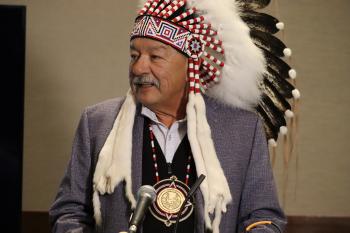Image Caption
Summary
Local Journalism Initiative Reporter
Windspeaker.com
A business alliance between the 17 member nations of the Confederacy of Treaty Six First Nations in Alberta is expected to present new opportunities that will pave the way to economic independence.
“We are stronger when we work together and this historic alliance will enable us to invest in big industry projects and other opportunities we may not have been able to obtain on our own through individual bidding,” said Treaty 6 Grand Chief George Arcand, Jr.
Arcand, who is also chief of the Alexander First Nation, and seven other chiefs joined on Dec. 14 at the River Cree Resort on the Enoch Cree Nation as the first signatories to the Confederacy Investors Group Ltd. Partnership (CIG).
“As a group we can be innovative by navigating colonial systems to propel us in a way that we will achieve long term economic sovereignty,” said Arcand.
An investment group has been talked about by chiefs for years, says Neal Mills, the confederacy’s project manager, energy investment strategy. But it only started taking shape when Enoch Cree Nation Chief Billy Morin and Sunchild First Nation Chief Jonathan Frencheater served as the grand chiefs.
A proposal for funding to get formal discussions off the ground was then submitted to and accepted by Natural Resources Canada (NRC) in 2019. However, everything stalled when the coronavirus pandemic hit in early 2020. It wasn’t until 2021 that the work was officially kicked off with a pipe ceremony.
Mills came on board in January 2022. Since then, he’s been using funding provided by NRC to travel through the Treaty 6 area to talk with chiefs and councils about the new economic strategy.
Elections during that timeframe and having to reiterate the plan to new councils has provided some challenges, says Mills. However, he is hopeful to have three more signatories by the end of week and the rest by the end of January 2023.
Signing on to CIG comes with a price tag of $100,000 from each nation, requiring them to purchase 1,000 units at $100 per unit. That money, intended as seed money and capital, will “prop up the business in its infancy,” said Mills, adding that the money will go into escrow in the unlikely occurrence of the venture not getting off the ground.
“The key to this whole deal is that everybody is an equal partner. That was a decision early on that it had to be that way or else we couldn’t go forward with this,” said Mills.
Every nation within CIG will split dividends or profits equally, despite the size of the nation and each nation will determine how to use their profits.
“As an investors group they’re all partners in this and they’re all going into this understanding and realizing that can generate wealth for their nations,” said Mills.
In announcing the new investors group, Arcand stressed that the focus wasn’t about generating wealth at any cost.
“Our goal is to make sure that we deal with all the big projects that happen as a united front and we will undertake to ensure that our investments are projects that make sense for us both economically and environmentally,” said Arcand.
Mills isn’t worried that promoting a sustainable, environmentally friendly economic atmosphere will turn off developers who are looking for partners.
“What I’m noticing of the trends in the last few years is that a lot of these companies really, really understand now where First Nations are coming from when they talk about that environmental stewardship and such,” he said.
In fact, says Mills, Arcand is already in discussions with Dow Chemical Co. about a possible partnership. Dow announced last year a project that would triple the size of the petrochemical plant in Alberta’s Industrial Heartland and provide a transition to net-zero emissions. Mills says the planned expansion will happen over the next 10-plus years and he believes it’s in the range of $15 billion to $18 billion.
The Industrial Heartland is in Treaty 6 territory.
Late September or early October, Arcand flew to Houston to meet with Dow CEO and the leadership group to talk about the Confederacy Investors Group.
“(Dow) seem to be watching this and basically the message was, ‘Let’s partner. We want to work with you guys.’ So, in essence, yes, we are... headhunting in a sense,” said Mills.
Mills has been in discussions with the Alberta Indigenous Opportunities Corporation for weeks and has another meeting scheduled for next week. AIOC, a provincial Crown corporation, backstops loan guarantees for Indigenous communities that want to be involved in resource development.
“I will utilize any organization like that that can help us in anyway, so if they offer more than just backstopping loans then we’ll certainly look at that,” said Mills.
He says he is not anticipating federal or provincial investment dollars as part of CIG.
“What we will do is utilize different funding sources, organizations, grants, loans, brokers, whatever it takes. But how they go forward will be determined by the board of directors once that’s set,” said Mills.
“We will show that working together we will have an ability to make a difference in our communities,” said Arcand.
Local Journalism Initiative Reporters are supported by a financial contribution made by the Government of Canada.

